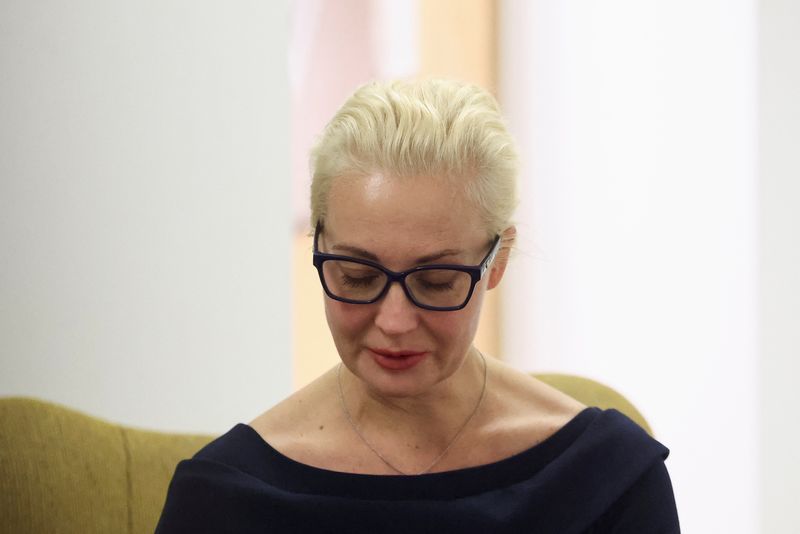LONDON (Reuters) - Yulia Navalnaya has vowed to continue the fight of her dead husband Alexei Navalny for a "free Russia" and called on supporters to oppose President Vladimir Putin with greater fury than ever.
What do we know about Navalnaya?
HER FAMILY AND CHILDHOOD
Yulia Navalnaya was born Yulia Abrosimova on June 24, 1976, in Moscow. Her father, Boris Abrosimov, was a scientist and her mother worked in the government.
A graduate of the prestigious Plekhanov Russian University of Economics, Navalnaya worked for some time in a Moscow bank.
FAMILY LIFE WITH NAVALNY
She met her future husband, then a young lawyer, while on holiday in Turkey in 1998. He was captivated by her ability to name all of Russia's current ministers by heart, the Sobesednik newspaper wrote in a 2020 article about the couple.
They married two years later and Navalnaya became a stay-at-home mother to the couple's children, Daria, born in 2001, and Zakhar, born in 2008. She and Navalny were both once members of the liberal Yabloko party.
SUPPORTING HER HUSBAND
Navalnaya frequently appeared beside her husband at rallies, on the campaign trail and in the courtroom during his many trials.
She attended his first significant criminal trial in Kirov in 2013, sitting calmly behind him as he faced 10 years in prison for allegedly stealing from a timber firm while working for Kirov's liberal governor.
"These bastards will never see our tears," she said after Navalny was handed a five-year sentence. He was unexpectedly released the next day following protests, and his sentence was later suspended.
Navalnaya was by her husband's side throughout his subsequent Moscow mayoral campaign in 2013, appearing on stage in front of a crowd of thousands to urge Muscovites to vote for him.
NAVALNY'S POISONING
Navalnaya played a key role in her husband's evacuation in August 2020 from Russia to a German hospital, where he underwent treatment for what Western laboratory tests showed was an attempt to poison him with a nerve agent in Siberia.
Navalnaya sent a letter to the Kremlin directly appealing for it to intervene and for it to grant permission for Navalny to be allowed to fly out of Russia.
The Kremlin said in response that it did not receive an official request for Navalny's transfer from his representatives, but that it had heard about the message from social networks.
Navalny's doctors in Omsk repeatedly delayed his transfer, citing his poor health. Two days after Navalny's hospitalisation a plane organised by a Germany-based nonprofit arrived to take him to Berlin.
Asked whether the authorities intervened to prevent Navalny from reaching Germany, Kremlin spokesman Dmitry Peskov said: "That is the decision of the attending physician."
MULTIPLE ARRESTS
Navalnaya has been arrested multiple times at protests related to her husband and his activist work.
She was detained twice in January 2021 at Moscow rallies held in support of Navalny after he was jailed on returning to Russia. "Sorry for the poor quality. Very bad light in the paddy wagon," she captioned a selfie posted to Instagram.
She was later fined 20,000 roubles ($265) by a court.
EMOTIONAL TOLL
The government's pressure on her husband was not always easy for Navalnaya to manage. Navalny told Reuters in 2017, ahead of his 2018 presidential run, that security services were tracking his wife and children, then aged 15 and nine.
"Cars are constantly passing by. I don't even pay attention to it any more, but Yulia is really bothered by it," Navalny said.
"The main feeling I had was that I shouldn't relax, show weakness," Navalnaya said in an interview conducted in Germany after her husband's poisoning. "If I fall apart, everyone will fall apart."
FUTURE PLANS

Navalnaya released a video message on Monday entitled "I will continue the work of Alexei Navalny". Currently living outside the country, she said she wants to "build a free Russia", but has yet to spell out her plans or to say where she will be based.
(This story has been corrected to say 'he was unexpectedly released the next day following protests, and his sentence was later suspended,' instead of 'he was released several months later by a court,' in paragraph 9)
(Reporting and writing by Lucy Papachristou; Editing by Nick Macfie)